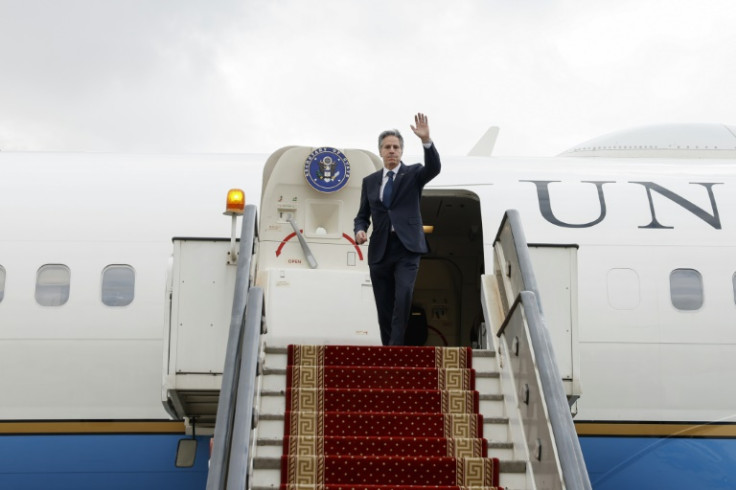
US Secretary of State Antony Blinken was due in Egypt on Tuesday as part of a Middle East crisis tour seeking a new truce and "an enduring end" to the Israel-Hamas war.
In Cairo, Blinken is scheduled to meet Egyptian President Abdel Fattah El-Sisi, the day after he held talks in Riyadh with Saudi Crown Prince Mohammed bin Salman.
The trip, Blinken's fifth to the region since the start of the nearly four-month-long war, will later include stops in Israel and Qatar.
Blinken's diplomatic push has been given fresh urgency as Israeli forces press further south towards Rafah, a Palestinian city on the southern border with Egypt where more than half the population of the Gaza Strip has taken shelter.
Shellings and raids continued Tuesday morning as Israel presses to eradicate Hamas in the wake of the militants' unprecedented October 7 attack.
"No place is safe, no place at all, where shall we go?" Palestinian Mohamad Kozaat said after six members of his family, including his daughter, were injured in an Israeli strike on the border town.
At least 99 people, mostly women and children, were killed in Israeli strikes overnight Monday to Tuesday, according to the health ministry in the Hamas-ruled territory.
Blinken is hoping to shore up support for a truce deal hashed out in Paris in January, but not yet signed off on by either Hamas or Israel.
He spoke with the Saudi crown prince about "the urgent need to reduce regional tensions", according to State Department spokesman Matthew Miller.
A surge in attacks across the region by Iran-backed Hamas allies has triggered counterattacks by the United States and its partners.
They also discussed "regional coordination to achieve an enduring end to the crisis in Gaza".
But Israel has vowed to press on with its retaliatory offensive, pushing as far into the Palestinian territory as needed to root out high-ranking Hamas officials.
The military "will reach places where we have not yet fought... right up to the last Hamas bastion, which is Rafah," Israeli Defence Minister Yoav Gallant said Monday.
In recent weeks, the Israeli military has pounded Khan Yunis, southern Gaza's main city and the hometown of Hamas's Gaza chief, Yahya Sinwar.
Gallant said Sinwar was "moving from hideout to hideout", without elaborating on his presumed current location.
Israel accuses Sinwar of masterminding the October 7 attack, which resulted in the deaths of about 1,160 people, mostly civilians, according to an AFP tally based on official figures.
Militants also seized around 250 hostages. Israel says 132 remain in Gaza -- including 28 believed to have been killed, according to updated figures from the prime minister's office.
Israel's campaign has killed at least 27,478 people in Gaza, mostly women and children, according to the Hamas-run territory's health ministry.
Israeli Prime Minister Benjamin Netanyahu said "a complete victory will deal a fatal blow" not just to Hamas but also to other Iran-backed militant groups across the region.
The truce Blinken is hoping to seal proposes a six-week pause to fighting as Hamas frees hostages in exchange for Palestinian prisoners held by Israel and more aid enters Gaza, according to a Hamas source.
Netanyahu, who has faced divisions within his cabinet and public fury over the fate of the remaining hostages, said Israel "will not accept" demands made by Hamas for an exchange.
The premier's Likud party quoted him as saying the terms "should be similar to the previous agreement", which saw a ratio of captives exchanged for Palestinian prisoners during a November truce.
While Blinken was en route to Egypt, a maritime security firm said a British-owned cargo ship was damaged in the latest attack off rebel-held Yemen.
The Barbados-flagged ship "reportedly incurred minor damage on the port side", British firm Ambrey said Tuesday, adding that there were no injuries.
For weeks, Yemen's Iran-backed Huthis have been targeting what they say are Israel-linked ships in solidarity with Palestinians.
The attacks on the vital Red Sea shipping route have disrupted global trade and prompted reprisals by American and British forces, including strikes on two "explosive-laden drone boats" on Monday, according to the US military.
US President Joe Biden has said he wants to avoid spiraling into a wider conflict in the Middle East, while Iran has condemned strikes in Yemen, Syria and Iraq.
On his first visit to the region since taking office, French Foreign Minister Stephane Sejourne on Monday urged the resumption of Israeli-Palestinian peace talks "without delay".
German Chancellor Olaf Scholz in a phone call told Netanyahu that "only a negotiated two-state solution would open up the prospect of a sustainable solution to the Middle East conflict".
In Riyadh, Blinken also discussed "building a more integrated and prosperous region", spokesman Miller said, alluding to negotiations cut off by the Gaza war for a landmark Saudi normalisation with Israel.




